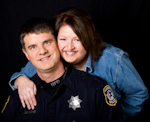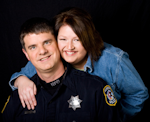In today's plethora of social media choices such as Facebook, LinkedIn, My Space, Twitter, and countless forums and blog sites, new arenas have been created that raise interesting questions of social etiquette and appropriate behavior. With law enforcement being such a high-profile public job there can be serious consequences arising from online missteps that extend beyond family and friends and into the work place.
A lot of LEOs take part in online social networking, while others are vocal in their belief that no cop should ever be a part of it, but why not? With discretion and care, it is a world you can reconnect with your past and network for your future.
First decision
Take control of your social media and decide what you want it to be. Are you going to connect with everyone you ever knew, or is it reserved for only close family and friends? Are you going to include people you work with, such as supervisors, or only those you spend time with outside work? Making these decisions will help you set boundaries on what to share on your social media pages. For instance, if the page is intimate and small then it is appropriate to share more personal information. However, if you have every person you work or have a casual acquaintance with in your network or friends list then it is best to stay positive and to only share details about yourself that you would share with a perfect stranger.
People form opinions about you based upon what you post or tweet. A negative facebook status update about your personal relationship with your wife could come back to haunt you at the job. Who wants a supervisor or a coworker to believe you are an emotional basket case with no boundaries? You especially do not want to post anything negative about a coworker, supervisor, or the agency you work for. Even in the corporate world, some employees are being disciplined for their lack of discernment in what they post, and many more create impressions that can have longstanding negative consequences.
Privacy measures
After you decide the purpose of your network page then go into the privacy settings and set them accordingly. If you do not want everyone to view your page or to be able to find you, set it as such. Pick the settings that fit the purpose of why you want to be on that site. Also, check your settings often because sites will make changes without notifying you and information you thought was blocked, such as a home phone number, can be revealed.
Privacy does not mean truly private
For most officers a thorough background check was conducted prior to being hired and in your career you are subject to consequences if your behavior is viewed unbecoming of an officer. It is not unheard of for LEOs to be disciplined because of activity on social media outlets. Just remember all your written words on the internet are permanent. If you are ever involved in an incident, your social media posts and personal information may be subject to subpoena just like cell phone text and similar records. Imagine this scenario:
You are involved in a shooting. While completely justified, and necessary to save yourself from a violent felon who would have otherwise likely killed you, you (and your department) are sued by the family of the deceased felon who are claiming racial bias was the reason you chose to shoot and kill their beloved rather than employ a lesser degree of force to extract from his hand the loaded gun he pointed at you.
Do you really want to be associated with questionable comments or jokes you innocently floated on the net that could now make you seem racially insensitive (at best) or an outright racist (at worst) and that could be dug up and presented as evidence against you? Also keep this in mind when you accept friends into your network. If they have criminal records or you know they are engaged in criminal or morally questionable behavior, or are the types lacking discretion in what they like to post, consider the implication this may have for you if your department takes a look at your sites.
Know what people are posting about you
Pay attention to what people are saying about you and the pictures they post. One way to do this is though Google searches. Google yourself on a regular basis and find out what information is out there about you. Be sure to include images and video as part of your search. When you are tagged in a picture on someone else's network page there is a good possibility it will come up in a search. It is not wise to have pictures up of sexual behaviors, being intoxicated, or any other compromising situations. Departments may Google their officers when there is an Internal Affairs Investigation, or when they are going for a new assignment or a promotion within the department. Be aware of video. If there is anything about you on YouTube.com, it had better be flattering and not call your personal judgment into question. That hilarious clip of you doing your sixth beer-bong at last year's toga-themed Christmas shift party? Maybe not so funny to the Chief when he is considering you as his next lieutenant!
When going for a new assignment or job
Consider disabling all social media accounts when you are looking for a job in law enforcement or a new assignment within the agency. The first thing employers in all fields do now is Google new recruits. What they find out about you may make the decision very easy for them.
Staying safe financially
Identity thieves are becoming savvy at using our information posted on social media sites. If your facebook page is open to public viewing an identity thief can gain your mother's maiden name or other information commonly used by your bank to identify information you thought was protected.
Also, if you do not personally know every one of your friends on your social media network, carefully consider what you post in regard to your physical location. Be careful about posting you are at a concert or on a vacation. It may give cue to the house burglar it is time to strike. Being a LEO you are a public figure and you most likely have made some enemies along the way. Do not assume every person on your friend list has good intentions.
Keep your romantic relationships safe & private
Never post your dirty laundry about your spouse or partner on a status update or a tweet. Even changing a relationship status from In a relationship to It's complicated can have negative consequences. First, it is disrespectful and embarrassing to your partner and/or spouse. Second, it is passive aggressive and will only feed the conflict. Third, it is too much information to dump on a social media site. Remember, friends and coworkers do make judgments about you based upon what you put up for public view. If you are a wife of a police officer it may give that badge bunny a reason to look at your man in blue.
Be wise about seeking out or including exes in your network. As a counselor, I am beginning to see emotional affairs with exes developing, with some leading to sexual encounters, as a result of facebook. If your marriage is going through a rough patch or you have already decided to break off the relationship, do not go seeking attention and validation from the opposite sex on facebook. Instead have the difficult conversations with your spouse/partner in person to start working on the solutions to repair the relationship. If you have decided it is over, do not break-up with them via text or leave chat rooms open for them to find. Do it face-to-face.
In closing, be wise about how you conduct yourself in public. Social media sites are not completely private and employers can hold you accountable for how you conduct yourself in public. As in anything, be safe out there and use wise judgment.

Michael Wasilewski
Althea Olson, LCSW and Mike Wasilewski, MSW have been married since 1994. Mike works full-time as a police officer for a large suburban Chicago agency while Althea is a social worker in private practice in Joliet & Naperville, IL. They have been popular contributors of Officer.com since 2007 writing on a wide range of topics to include officer wellness, relationships, mental health, morale, and ethics. Their writing led to them developing More Than A Cop, and traveling the country as trainers teaching “survival skills off the street.” They can be contacted at [email protected] and can be followed on Facebook or Twitter at More Than A Cop, or check out their website www.MoreThanACop.com.

Althea Olson
Althea Olson, LCSW and Mike Wasilewski, MSW have been married since 1994. Mike works full-time as a police officer for a large suburban Chicago agency while Althea is a social worker in private practice in Joliet & Naperville, IL. They have been popular contributors of Officer.com since 2007 writing on a wide range of topics to include officer wellness, relationships, mental health, morale, and ethics. Their writing led to them developing More Than A Cop, and traveling the country as trainers teaching “survival skills off the street.” They can be contacted at [email protected] and can be followed on Facebook or Twitter at More Than A Cop, or check out their website www.MoreThanACop.com.


